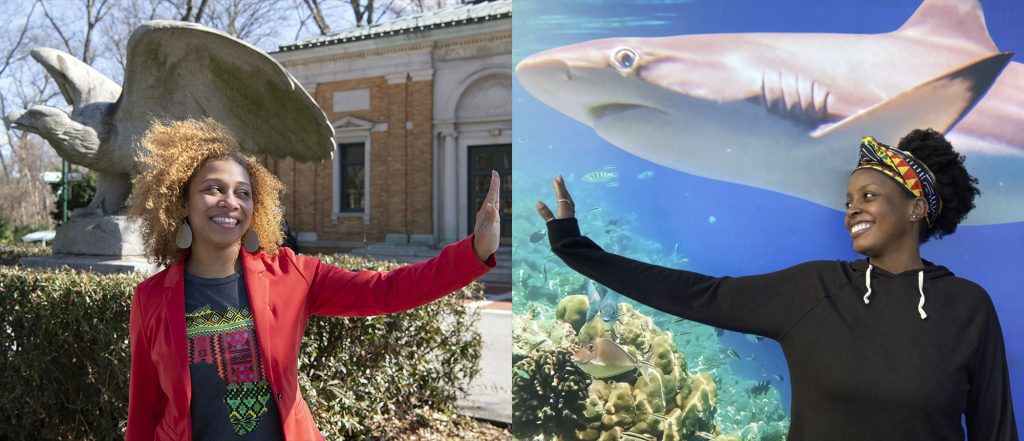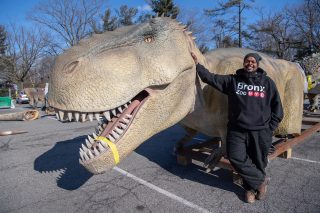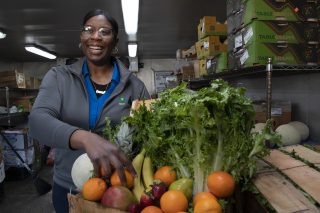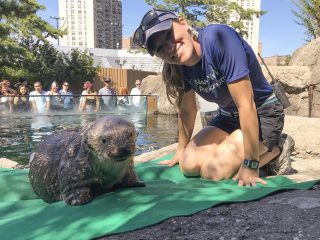
February 28, 2022
Elaine Glover-Rodriguez and Jasmine Crowell: Luminaries in Leadership
- as seen by -
 Julie Larsen
Julie Larsen
Black History Month recognizes the accomplishments of African Americans, embraces equality, and strives to build opportunities for future generations.
Jasmine Crowell (right) and Elaine Glover-Rodriguez (left) work for the Wildlife Conservation Society. They are co-leaders of BLAC, Black Leadership Advancement Consortium, a diversity, equity, and inclusion program at WCS.
We talked about their perspectives, collaborations, and careers as Black women in the conservation field.
JLM: What are your roles at the Wildlife Conservation Society?
JC: I am a Wild Animal Keeper at WCS’s New York Aquarium. I work in the shark division which involves training and caring for a variety of sharks, rays, fish, and sea turtles.
EGR: I am WCS’s Assistant Director of Education Administration based at the Bronx Zoo. I supervise and support education staff and develop processes that keep us all more efficient and effective. I also serve as a key liaison and collaborator with other WCS departments.
JLM: How did you find your way to careers at WCS?
JC: I have always had a love of animals but didn’t know where I could turn to make it a career. I knew I couldn’t go into terrestrial animals (I have bad allergies), but I didn’t know what other options there were. Once I learned about marine biology and its related careers, I knew what I wanted to study and earned a Bachelor of Science degree in Marine Biology. I found out that I wanted to start my career as an animal keeper around the time I got my first job at New York Aquarium’s gift shop. After volunteer work, an internship, and a water quality and training position in Florida, I was hired as a wild animal keeper at the aquarium.
EGR: I spent nearly a decade as a civil servant for New York City working to create accessible and engaging opportunities for young people. I was drawn to WCS’s commitment to positively impact the world through conservation education. It is a unique opportunity to serve as an ambassador of change in the community where I grew up.
JLM: You are co-leaders of BLAC (Black Leadership and Advancement Consortium), the very first Employee Resource Group (ERG) for African American employees at WCS in its 126-year history. What does that mean to you personally?
JC: Even though there have been great strides in diversity and growth in the conservation field, there is still so much work to be done. That being said, I am only one of few black keepers at WCS and the first at New York Aquarium. Having never heard of ERGs until recently, I was very interested in joining a group of like-minded people with a similar identity.
EGR: As a newcomer to the field of conservation, I’m learning each day how many firsts an ERG like BLAC is positioned to be a part of. As Jasmine says, there is work to be done to remain a part of the conservation conversation. We aim to make sure that staff at all levels feels considered, supported, and heard by creating more opportunities for historically marginalized groups to advance. I know that WCS is committed to this mission and ERGs like BLAC are invested in making these strides.
JLM: What are some of your achievements and challenges?
JC: Over the years as a keeper at the aquarium, I’ve progressed significantly with my skill and experience by training a wide variety of marine animals. I’ve gotten to share those experiences, and conservation in general, with those interested in the field. Inspiring and educating others on wildlife and how to better protect the environment have been some of my biggest struggles and my best successes.
EGR: To be honest, my biggest struggle is being a newcomer at WCS. Navigating how to meet colleagues in a pandemic-induced hybrid workspace has been a huge challenge. The formation of BLAC has enabled me to connect with colleagues across WCS and learn what they value.
JLM: What are the mission and goals of BLAC for the organization? What do you hope to achieve in the first year?
JC: It is our goal to establish a solid foundation of community, growth, and support for BLAC to stand on while encouraging others to participate in continuing its mission. I hope that the establishment of this group, and all the ERGs at WCS, will serve as a comfort to current and potential employees to know that there is a community for them to turn to in the workplace.
EGR: BLAC’s mission is to cultivate an inclusive and diverse work environment that develops potential leaders, extends opportunities, and enables equitable growth for Black people within WCS. Among our goals as a group is to build an authentic community with fellow WCS staff so they feel welcomed, included, and supported across the organization. We also want to be a resource to those considering joining the WCS workforce through partnerships and collaborations.
JLM: What does Black History Month mean to you?
JC: Black history is more than a finite month to me; I live it every day. I celebrate and honor my Black history by continuing to strive for success, and to never forget my ancestors and family, and the sacrifices they endured to get me where I am today.
EGR: Black History Month to me is an everyday experience. I celebrate each day of my history. I take to heart that my success is because of those who came before me and their indominable spirit. It is my responsibility to do more than just leave the door open for the next generation. I must guide them through it and applaud them every step of the way.
JLM: What advice would you give the next generation on a career in conservation?
JC: It takes a lot of perseverance to get into marine biology but a foot in the door is a first step. I did a lot of volunteering and networking. The field is relatively small and can be stressful, but the reward is worth it.
EGR: Anything worth doing takes heart, faith, and persistence. I am by no means a zoologist, but I am committed to my work and my team, and the way we help to educate thousands about conservation every year. For a young person thinking about a career in conservation, the possibilities are endless. All WCS staff play an integral role in our conservation work that continues to thrive and grow.
EDITOR’S NOTE: Each year, Black History Month is celebrated during February. Women’s History Month begins March 1. Wild View is featuring posts by and about women and their contributions to science and conservation throughout the month.




Comments